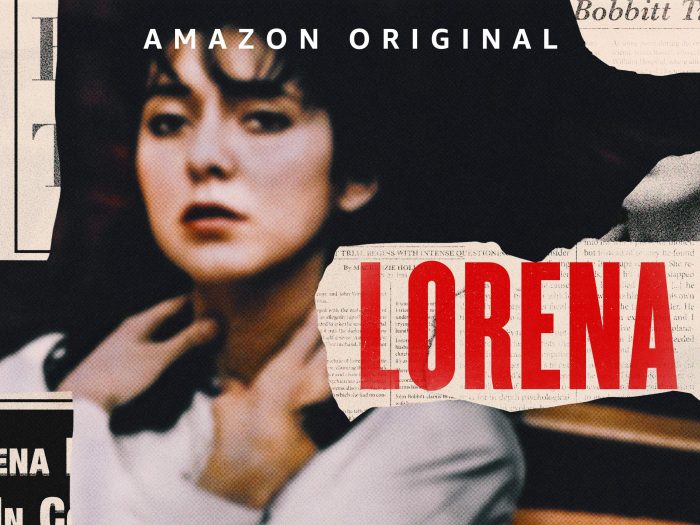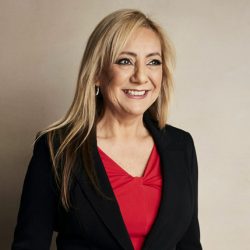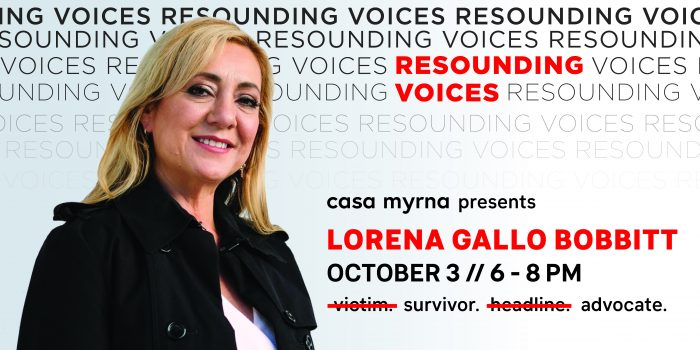Interview: Lorena Gallo Bobbitt, Survivor and Advocate
On Thursday, October 3, Lorena Gallo Bobbitt will appear in conversation at Casa Myrna’s Resounding Voices event to kick off 2019’s Domestic Violence Awareness Month. In 1994, after a desperate act of self-defense, Lorena Gallo Bobbitt found herself at the center of one of the decade’s most sensational news spectacles. During the event, Lorena will open up about how she survived her husband’s abuse, endured both of their criminal trials and the unrelenting media attention that accompanied them, and transformed herself into a champion for survivors of domestic violence.
Learn more about Lorena’s upcoming event with Casa Myrna in our press release and buy tickets here. Use the code ENDDV for 50% off!
This winter, Lorena returned to the public stage through the Amazon Prime docuseries Lorena, directed by Joshua Rofé and produced by Jordan Peele, available to stream now. In this interview, she discusses her advocacy work with fellow survivors and her hopes for the movement to end domestic violence.
Why was it important to you to do this event for Domestic Violence Awareness Month?
As a survivor of domestic and sexual violence myself, I don’t want anyone to go through the devastating things I experienced. If talking about all of the horrible abuse that I went through and how I recovered has helped one person escape domestic violence, then the trauma I experienced was not in vain. As an activist and advocate, I want to reach out to those who are in abusive relationships and speak out for those who don’t have voices. By sharing my experience, I have the opportunity to help educate others about these critical issues. I’m blessed; this is truly a gift.
Why did you want to work with Casa Myrna?
I’m humbled and honored to be able to join Casa Myrna to help serve survivors of domestic and sexual violence. Organizations like Casa Myrna are more than just a safe haven for those trying to escape an abusive relationship. You can find not only a food, a bed to sleep in, and other practical supports, but also a community of survivors where you can learn to trust other people again and to empower yourself and others. I have worked many years with shelters in my hometown, and I have seen how transformative the relationships that survivors make with each other and with advocates can be.

Lorena, the docuseries featuring her story, was released by Amazon Prime Video on February 15, 2019.
Why have you decided to take on a more public advocacy role lately, instead of the quieter role you have played locally in the past in your hometown?
As an advocate and with my foundation, I have been working with shelters in my community for many years now, including as a counselor and facilitator one on one with survivors. My concern grew more and more as I’ve saw how common domestic violence and sexual violence still are, 26 years after what I went through. I wanted to figure out ways I could make a bigger contribution to help keep the movement to end domestic and sexual violence going.
Now, with the help of Jordan Peele and Amazon Prime studios, because of the Lorena docuseries, I’ve been able to step onto a larger platform. I can reach and educate more people, including the younger generations and people who are not already passionate about these critical issues. Perpetrators of domestic violence are deceptive and crafty. Their crimes take place behind closed doors, and the evidence often remains hidden there too. That’s why it so important to reach as many people as possible to give hope, educate them about red flags, and raise awareness about how common abuse is. You never know who might be suffering and need help.

Lorena embraces executive producer Jordan Peele at the premiere of “Lorena” during the 2019 Sundance Film Festival.
What does the Lorena Gallo Foundation do?
It is very important for me to give victims and survivors a voice: silence is not an option! We have come a long way with the help of dedicated advocates and activists, we are continuously making steps in the right direction, but there still much more to do.
The Lorena Gallo Foundation’s mission is to raise awareness and offer education to diminish the impact of domestic violence on millions of survivors and victims here in the U.S. and around the world. Domestic violence is a very complex problem that doesn’t have one single solution. That’s why it is so important to develop more resources and engage more communities to help destigmatize experiencing abuse in a relationship. We’re dedicated to working in partnership with nonprofits, colleges and universities, and other organizations to address this pervasive issue together.
Recently the struggles of immigrant survivors have been in the news because the current presidential administration is no longer allowing people to apply for asylum in the U.S. on the basis of suffering domestic violence in their home country. How did being an Latina immigrant shape your experience as a victim of abuse?
As an immigrant woman, I was often too scared to call the police for help. My abusive husband always threatened that he could have the police detain me and have me deported back to my country. This is the fear weighing down on most immigrants who are in an abusive relationship. Immigrant mothers who are in an abusive relationships are also very much afraid to lose their children.
The new generation of the Latinx community will continue to face challenges getting help with domestic violence and sexual assault from the justice system due to the complexity of these issues. There are many inconsistencies in the policies that affect immigrant survivors, and courts, police, and lawyers lack knowledge about how to handle cases where the victim is afraid of getting involved due to their immigration status. That’s why intersectional education on both domestic violence and immigration is so necessary and important.
What has changed about attitudes towards domestic violence since the 1990s?
These days, many more people in our society and organizations are taking a more active stance against intimate partner violence. In the 90s, there were not as many resources available to help victims and survivors of domestic violence. For example, though Casa Myrna was around back then, but it was much smaller, with fewer staff and programs, and couldn’t help as many people get away from abusive relationships.
Another big change is the power of the internet and social media. Not only do we have the 24-hour news cycle that started in the 90s, we have tools available to everyone that allow them to start great conversations like those that have come out of #MeToo and #TimesUp and to keep raising awareness. It’s easier now for people to both learn about abuse and find out where to get help.
What message do you want to send to survivors?
The message I would like to send is to cultivate resilience. Keep moving forward and never give up hope because you are not alone. Silence is not an option, and if you speak up and speak out, you will be heard. Abuse is never acceptable, and you deserve a happy life.
Educate yourself to empower yourself. Learn as much as you can about the many resources available to you. In Massachusetts, you can call the SafeLink Hotline at 1.877.785.2020 to get referrals or just to talk.
Finally, remember that you are the person who knows your situation best and what you need to be safe. Take care of yourself, and recognize the strength you already have to survive.
About Lorena Gallo Bobbitt

Survivor and advocate Lorena Gallo was born in Bucay, Ecuador and raised in Caracas, Venezuela. At the age of eighteen, she moved to the United States to study English. There she met and married U.S. Marine John Bobbitt. Less than one month into the marriage, Gallo began to suffer psychological abuse and severe physical and sexual violence. Neighbors and coworkers noted recurring bruises and other signs of severe violence, and there were numerous interventions by the police.
In June of 1993, Gallo requested a restraining order against her husband and was told that she would have to appear before a judge the following week. Three days and two sexual assaults later, she became a national headline. Gallo was arrested and charged with maliciously wounding Bobbitt. She was placed on trial in January 1994, where she testified before a jury of seven women and five men about four years of excruciating abuse leading up to her assault, her attempts to seek protection in the courts, and the sexual violence she had endured in the three days leading up to the event. A psychiatrist also testified that Gallo suffered a “brief reactive psychosis” that drove her to attack the instrument that was the weapon of her torture. After six hours of deliberations, the jury acquitted Gallo on the grounds of temporary insanity, concluding that the torture and abuse she had suffered at the hands of John Bobbitt had created an “irresistible impulse.”
Today Lorena Gallo lives in the Washington, DC area with her partner of over 20 years and their teenage daughter. She has dedicated her life to helping victims of domestic abuse and their families, both through her work as a facilitator and advocate at local shelters and through the Lorena Gallo Foundation. She tells her story in the Amazon Prime Video docuseries Lorena (dir. Joshua Rofé and exec. prod. Jordan Peele), released in February 2019, in order to destigmatize having experienced abuse, educate people on the trauma of domestic violence and sexual assault, and to encourage survivors to seek support in escaping violence and healing psychologically


